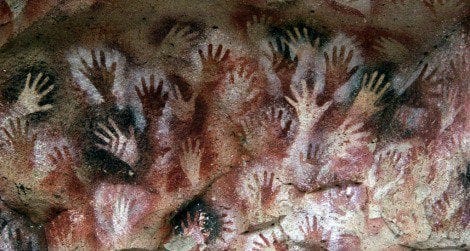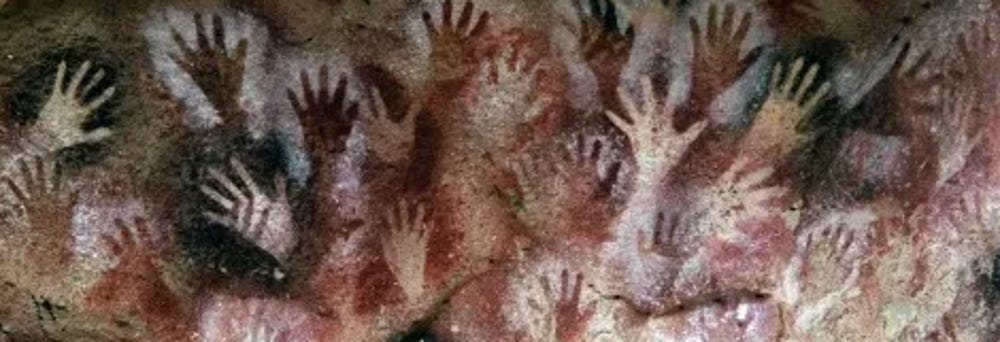Spirit, Heart, Head, Hands
Approaching the world in the right order might be a key to rethinking our relationships and building a healthier society.
I've spent most of the past few weeks off the grid and will be mostly off until the 4th of July. This time living in community opens my eyes in different ways every year. This year I've been ruminating on an insight from Tyson Yunkaporta about how we engage in the work of building and rebuilding communities. In his exceptional book Sand Talk (that I cannot recommend highly enough), Yunkaporta reveals that we tend to engage in the work of serving communities backwards. Rather than respect, connect, reflect, direct — where we begin by thoughtfully listening to cultures and traditional knowledge before building relationships before planning and designing before launching programs. We tend to do the exact opposite — often doing damage in the process, unleashing unnecessary and predictable unintended consequences and then moving on “enlightened” by the experience to do better work next time, but not elevating the places, people, and communities where we have been spending time, energy, and resources. This common inversion has been described differently in many philanthropy critiques, but Yunkaporta's resonates deeply with my own profesional experiences.
My current rumination on my experience of my own life and community suggest there might be a deeper, more personal impact of this order of operations for us to consider as well that I offer as a question/suggestion/gentle mid-summer provocation.
We make life decisions and set priorities constantly everyday, mostly invisibly based on the habits and cultures and stories we carry around with us. Some of them are deeply personal. Some are completely subconscious. Others are openly stated cultural pillars of nations or institutions to which we belong. Others are more subtle, less obvious and feel more like the water we swim in and therefore both less apparent and more inevitable. But in modern Civilization, the base level of how we are expected to choose and prioritize our time, energy, effort, and purpose is oriented exactly backwards to what Yunkaporta suggests — just like so much of our social change work itself.
Generations deep into the Industrialization of Meaning, we are expected to work first, to prioritize action, to accept orders, to be efficient then to consider improvements, to innovate, to try new things, to entrepreneurialize and pursue new solutions but without questioning the underlying assumptions or goals of the systems we’re part of — or even how our choices might impact what matters most to us. Then in our spare time, when we’re not laser focused on our economic productivity, we might consider how these things make us feel, what else might be important to us, how to support the emptiness those choices leave us with and the lack of time the priorities leave us with for the things that seem more important like family or faith. And maybe, in the rare moments left, in irregular out of band experiences, maybe we find glimpses of more, of something larger, something beyond us and our life time, that connects to our past and to the future, that creates an overarching sense of momentum and purpose that isn’t purely and brazenly man-made, that might point to a more deeply ordered sense of the universal in our small and essential lives. That learned order of operations puts our Hands first, our Heads second, then consider our Hearts, and maybe Spirit last.
Perhaps it is exactly this out-of-orderness that makes Civilization often feel uncomfortable, unsettling, ill-fitted to our deepest inspiration. What if we take Yunkaporta’s critique personally? What if his respect is about putting Spirit first? Connection puts Heart second, reflection puts our Head next and direct puts action, our Hands last? What if we inverted our ordering just like Yunkaporta suggests? What if we greeted the world Sprit, Heart, Head, then Hands? (Not to be confused or conflated with the 3hree learning model or various Christian apologetics ministries — spirit here might mean any concept of something larger and beyond our lifetime, any higher power, spirituality, or sense of the divine.) What if our relationship to the universe, the world, to our past and our future came first? Then how might being part of that continuity of past, present, and future might inspire and effect our hearts in connection with all of nature and all other people? Then how might we design, build, improve, redesign, rebuild the systems around us? How might we use our time and energy in the world and in service of what? How might the way we value time and effort change? How might our horizons and hyper individualized sense of identity expand? How might our relationships and communities benefit differently from our service? How much more diverse, more free, and more creative might our worlds feel? What else might be possible?
Please consider becoming a paid subscriber to support this work. Subscribing to 7 Bridges is the best way to keep it free and open to all.





Great thoughts and very well written.